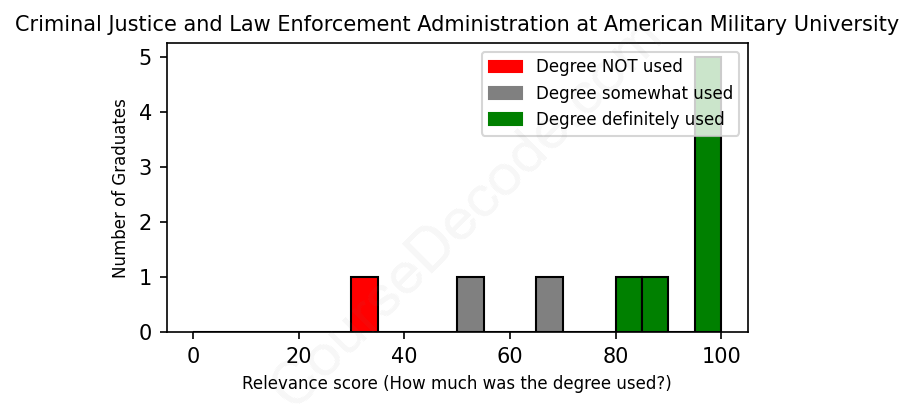
First, some facts. Of the Criminal Justice and Law Enforcement Administration graduates from American Military University we've analyzed , here's how many have used (or NOT used) their degree in their career:

These are estimates based on AI analysis of 10 LinkedIn profiles (see below).
The verdict? Significantly above average. Overall, with an average relevance score of 81%, Criminal Justice and Law Enforcement Administration graduates from American Military University have a much higher likelihood (+14%) of finding work in this field compared to the average graduate across all fields:
And for comparison, here's the chart for all profiles we've looked at across all degrees.
Also, after graduating, 70% of these graduates have pursued further education other than another Bachelor's degree (such as a Masters degree or other), compared to the average across all profiles of 35%. This suggests you may need more than just a Bachelors degree to be competitive as a Criminal Justice and Law Enforcement Administration graduate.
See the details:
|
Relevance score: 31% We think this person has NOT gone into a career related to their degree. We think this person has NOT gone into a career related to their degree.
DEGREE INFOGraduated in 2021 from American Military University with a Bachelor of Arts - BA in Criminal Justice and Law Enforcement Administration. Also pursued further education since (see below). JOB HISTORY SINCE GRADUATIONElectrical Technician AAA USA Jun 2022 - Jul 2022 Lead Electrical Technician  AAA USA Jul 2022 - Feb 2023 Avionics Electrical Technician 2nd Class  U.S. Coast Guard Jun 2023 - Present FURTHER DEGREES DONE SINCE GRADUATINGMaster of Arts - MAAmerican Military University 2023 - 2024 ABOUTReliable Team Leader specializing in production logistics. Adept at identifying, inspecting, repairing, maintaining and replacing aircraft components. Exceptional eye for detail with organized approach and strong multitasking abilities. Extensive background in telecommunications, customer service, consumer and business sales. |
The top 10 most common jobs done by the graduates we've analyzed (ranked most common to least) are:
When we look at the job paths of graduates from American Military University who studied Criminal Justice and Law Enforcement Administration, we notice a mix of roles that heavily align with their field and others that don’t. Many graduates find positions as police officers or involved in law enforcement, like the Patrol Sergeant and Criminal Fraud Investigator roles. These jobs clearly utilize the specific skills and knowledge learned during their studies, as they require a solid understanding of legal practices and law enforcement principles. Other roles, such as Task Force Officers, Community Service Aides, and the various security-related positions, also strongly connect with their degree, emphasizing direct engagement with criminal justice work.
However, there are quite a few jobs that drift away from the core focus of criminal justice. Positions like Contract Specialist, Senior IT Project Manager, and even franchise ownership seem more business-oriented or administrative, lacking the necessary components of law enforcement. Even some technical jobs, such as Electrical Technicians, while they may require problem-solving skills, don't directly engage with criminal justice expertise. Overall, while many graduates are landing relevant roles that leverage their education, there's a noticeable number who venture into unrelated fields, which can make it a bit of a mixed bag regarding job relevance to their degree.
Here is a visual representation of the most common words in job titles for Criminal Justice and Law Enforcement Administration graduates (this is across all Criminal Justice and Law Enforcement Administration graduates we've analyzed, not just those who went to American Military University):

Based on the LinkedIn profiles of graduates from American Military University with a degree in Criminal Justice and Law Enforcement Administration, it looks like many of them have followed solid career paths relevant to their field. Right after graduation, a lot of them seem to land jobs in law enforcement or security roles. For example, those who graduated between 2019 and 2021 often started as police officers, reserve officers, or interned in legal settings. It's clear that a significant number are making their way into the core of criminal justice work, which is pretty impressive!
Fast forward five to ten years, and you'll notice that many of these graduates continue to build on their experiences by moving into higher ranks or more specialized roles. People have taken positions such as Patrol Sergeant, Criminal Fraud Investigator, and even key roles at agencies like the U.S. Department of Homeland Security. Those who went into the business side of things have found success in operations management and contract specialist roles too. While there might be a few who have ventured into unrelated jobs—like owning a franchise or working as an electrician—the overall trend suggests that most are carving out strong careers that relate back to criminal justice and law enforcement. So, if you're considering this field, the prospects look pretty good!
Honestly, a Bachelor’s degree in Criminal Justice and Law Enforcement Administration, like the one at American Military University, is generally considered to be moderate in terms of difficulty. It’s definitely not the hardest degree out there, but it does require a good amount of reading, writing, and some critical thinking. You'll cover various topics like law enforcement, criminal theory, and ethics, which can be pretty interesting if you’re into that stuff. If you stay organized and keep up with your assignments, you’ll likely find it manageable. Just be prepared to engage with the material and put in some effort, and you should do just fine!
Most commonly, in the LinkedIn profiles we've looked at, it takes people 3 years to finish a Bachelor degree in Criminal Justice and Law Enforcement Administration.
Looking at these graduates from American Military University, it seems like most of them have landed pretty decent jobs, especially in the criminal justice and law enforcement fields. Many are involved in government roles or police departments, which often come with solid benefits and salaries, especially as they move up in rank or position. For instance, the Patrol Sergeant and Maritime Operations Program Manager likely earn good pay, plus the Chief Operations Officer role indicates some significant responsibility and, presumably, a good paycheck. There are a few who have taken on internships or have jobs that may not be as lucrative right now, like the legal interns and project management roles, but those experiences can help pave the way for better-paying positions in the future. Overall, it looks like they’re on a promising path to making decent money!
Here is a visual representation of the most common words seen in the "about" section of LinkedIn profiles who have a Bachelor degree in Criminal Justice and Law Enforcement Administration (this is across all Criminal Justice and Law Enforcement Administration graduates we've analyzed, not just those who went to American Military University). This may or may not be useful:

Here are all colleges offering a Bachelor degree in Criminal Justice and Law Enforcement Administration (ordered by the average relevance score of their Criminal Justice and Law Enforcement Administration graduates, best to worst) where we have analyzed at least 10 of their graduates:
| College | Score | Count |
|---|---|---|
 American Military University American Military University
|
81 | 10 |
 Columbia Southern University Columbia Southern University
|
70 | 16 |
 Western Illinois University Western Illinois University
|
63 | 20 |
 Columbia College Columbia College
|
59 | 10 |
 John Jay College (CUNY) John Jay College (CUNY)
|
57 | 11 |
 University of Phoenix University of Phoenix
|
54 | 88 |
 Florida International University Florida International University
|
53 | 13 |
 Park University Park University
|
53 | 23 |
 Virginia Commonwealth University Virginia Commonwealth University
|
34 | 10 |